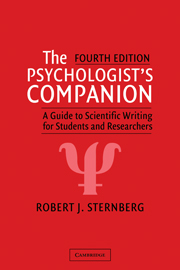Book contents
- Frontmatter
- Contents
- Acknowledgments
- Introduction
- 1 Eight Common Misconceptions about Psychology Papers
- 2 Steps in Writing the Library Research Paper
- 3 Steps in Writing the Experimental Research Paper
- 4 Rules for Writing the Psychology Paper
- 5 Using the Internet to Aid the Research Process
- 6 Commonly Misused Words
- 7 American Psychological Association Guidelines for Psychology Papers
- 8 Guidelines for Data Presentation
- 9 References for the Psychology Paper
- 10 Standards for Evaluating the Psychology Paper
- 11 Submitting a Paper to a Journal
- 12 How to Win Acceptances from Psychology Journals: Twenty-Nine Tips for Better Writing
- 13 Writing a Grant or Contract Proposal
- 14 How to Find a Book Publisher
- 15 Writing a Lecture
- 16 Article Writing 101
- References
- Appendix A Sample Psychology Paper
- Appendix B Writing for British and European Journals
- Index
9 - References for the Psychology Paper
Published online by Cambridge University Press: 05 June 2012
- Frontmatter
- Contents
- Acknowledgments
- Introduction
- 1 Eight Common Misconceptions about Psychology Papers
- 2 Steps in Writing the Library Research Paper
- 3 Steps in Writing the Experimental Research Paper
- 4 Rules for Writing the Psychology Paper
- 5 Using the Internet to Aid the Research Process
- 6 Commonly Misused Words
- 7 American Psychological Association Guidelines for Psychology Papers
- 8 Guidelines for Data Presentation
- 9 References for the Psychology Paper
- 10 Standards for Evaluating the Psychology Paper
- 11 Submitting a Paper to a Journal
- 12 How to Win Acceptances from Psychology Journals: Twenty-Nine Tips for Better Writing
- 13 Writing a Grant or Contract Proposal
- 14 How to Find a Book Publisher
- 15 Writing a Lecture
- 16 Article Writing 101
- References
- Appendix A Sample Psychology Paper
- Appendix B Writing for British and European Journals
- Index
Summary
Authors of psychology papers should be aware of the references available to them. This chapter, which is divided into two parts, contains a list of such references. The first part briefly describes general references that may be useful in all areas of psychology, whereas the second part briefly describes many of the journals psychologists read and consult when writing papers. Wherever possible, descriptions of the journals have been paraphrased from those provided in the journals themselves. The publisher's name and address are supplied at the end of each journal description and can be used to request further information about the journal and for subscriptions. This address is not appropriate for submission of manuscripts, because manuscripts are submitted to the editor of a journal, not the publisher. Because the editorship of a journal usually changes on a fairly regular basis, I do not provide here the names and addresses of editors, but they can be obtained by consulting recent issues of each journal. In addition, the journals usually contain useful information on style, specifications for articles, deviations from APA guidelines, and so on.
GENERAL REFERENCES
A Comprehensive Dictionary of Psychological and Psychoanalytical Terms: A Guide to Usage
A Comprehensive Dictionary of Psychological and Psychoanalytical Terms: A Guide to Usage contains many of the technical terms most frequently used in psychology and psychoanalysis.
- Type
- Chapter
- Information
- The Psychologist's CompanionA Guide to Scientific Writing for Students and Researchers, pp. 165 - 197Publisher: Cambridge University PressPrint publication year: 2003



